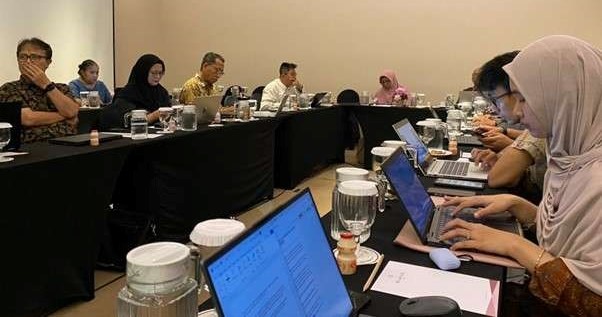
FORCLIME has supported Bappenas since 2022 in the carrying out of studies aimed at optimizing the bioeconomic use of forests within Indonesia. The initial concept for forest bioeconomic development is set out under the draft National Long Term Development Plan (RPJPN) 2025 - 2045. However, in an effort to further sharpen this concept into a five-year planning document or National Medium Term Development Plan (RPJMN), Bappenas plans to draw up a road map for forest bioeconomic development within Indonesia. For this reason, a series of discussions were recently held with parties directly involved in the potential development of the forest bioeconomy industry, including the Ministry of Environment and Forestry (KLHK) and the Indonesian Chamber of Commerce (Kadin).
The study on forest bioeconomy was conducted by a team of consultants, the results of which were then presented by Mr. Tatang H Soerawidjaja, a representative of the Forest Bioeconomy study consultant team during a meeting that was chaired by the Director of Forestry and Water Resources Conservation (KKSDA) at the Ministry of National Development Planning/Bappenas, Dr. Nur Hygiawati Rahayu, in Depok, West Java on 6 - 7 October 2023. The purpose of this meeting was to: (i) Conduct a final review of the study that has been prepared; (ii) Obtain policy input regarding the potential, opportunities, challenges and direction of forest bioeconomic development within Indonesia from related parties; (iii) Formulate a strategy for the development of a National Policy and Mainstreaming Forest Bioeconomy in Indonesia. The meeting was attended by representatives from the Ministry of Environment and Forestry (Planning Bureau, the Directorate-General of Forest Utilization Business Control, the Directorate-General of Sustainable Forest Management, the Directorate of Forest Product Processing and Marketing Development and the Directorate of Forest Resource Inventory and Monitoring), as well as representatives from the Ministry of Energy and Mineral Resources (the Directorate-General of New Renewable Energy and Energy Conservation) and the Ministry of Investment/BKPM. In addition to the consultants' team and FORCLIME, representatives from the private sector were also present, specifically the Indonesian Forest Concession Holders Association and Kadin.
Bioeconomy involves the use of resources (bioresources) which are not limited to food and feed, but also include energy sources and industrial raw materials. Benchmarks for forest bioeconomic development include the following: 1) Utilization of vegetable resources must be efficient and must meet the pyramid of needs; 2) Recognition of the potential of trees to produce non-food oils as a potential substitute for the role of petroleum as biohydrocarbons and biodiesel; 3) This potential can be processed in biorefineries; 4) Forest sources must be fortified with buffer zones for conservation purposes.
The target for forest bioeconomic utilization is the expansion of wood production into various products, including biorefineries for vegetable-based chemical products and biomaterials. Non-wood-producing tree-based vegetable refineries are also being targeted, for example for latex, essential oils and other substances that can be extracted and further utilized.
The topic of bioeconomics has been incorporated into the 2025 - 2045 RPJPN under the economic transformation section. This economic transformation encompasses eight Development Agendas and 17 Development Programmes with the overall aim of achieving a Golden Indonesia 2045. It is hoped that the results of this bioeconomic study can be used as input during the preparation of Bappenas planning documents (RPJPN 2025 - 2045 and RPJMN 2025 - 2029).
For more information, please contact:
Pipin Permadi, Senior Adviser for Forest Policy
Tazkiyah Syakira, Junior Adviser for Monitoring, Evaluation and Reporting






